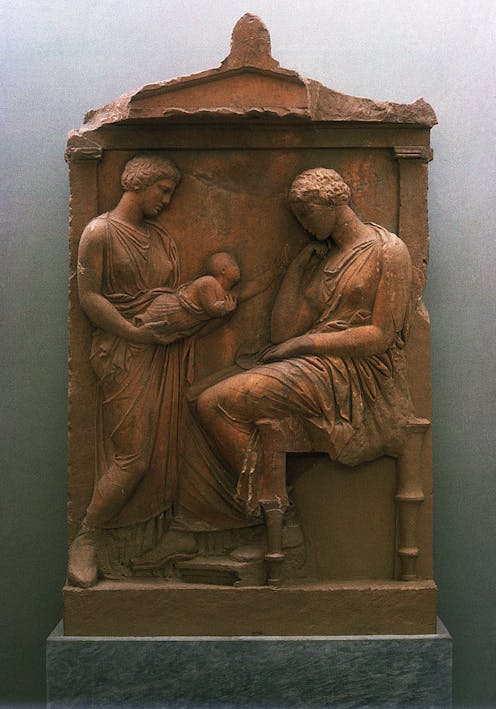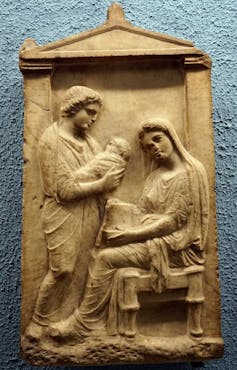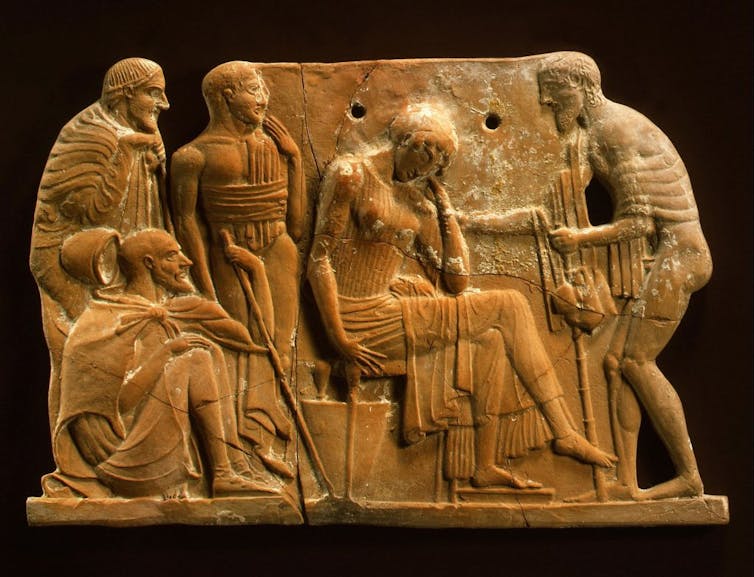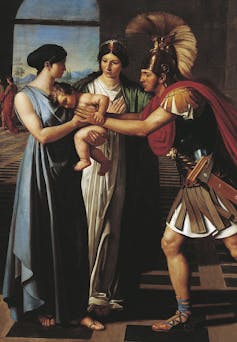
As a father of three and the husband of an amazing woman, I know that one day a year is far too little to recognize everything mothers do. But my work as a scholar of ancient Greek literature has shown me how much harder it was to be a mother in antiquity.
The ancient Greeks may not have had the kind of Mother’s Day celebrated in the United States and United Kingdom today – holidays that began at the turn of the 20th century and in the Middle Ages, respectively. But they did have festivals to honor motherhood, focused primarily on the goddess Hera or the earth mother Cybele – though more often than not, women did the lion’s share of the labor for those events.
The stories that remain of both real and mythical mothers let us know how important they were. Thanks in part to their connection to the life cycle, women in ancient Greece were both symbols of mortality and a force to humanize heroes.
Historical lives
What we know of women’s lives in ancient Greece is generally not good. According to the poet Hesiod, typically dated to around 700 B.C., it was thought good practice for women to be married off to older men “four or five years after puberty.” Philosophical and medical traditions of the time saw women as inferior and defined by their ability to give birth, even though the popular notion was that male semen contained everything needed for a baby.
We have uncertain evidence for what lives were like after marriage. Some accounts estimate an average of six births per woman, and as many as 40% of infants may not have survived to a marriageable age, though estimates of infant mortality vary. Most historians agree that child loss was common enough in antiquity to be an expectation rather than a surprise.

Information about maternal mortality is equally obscure, though demographic data suggests that at times more than 30% of mothers died from complications related to childbirth. But there is anecdotal evidence from funeral inscriptions gathered from all over antiquity’s Greek-speaking world. The 21-year-old Prakso, wife of Theocritus, died in labor and left a 3-year-old behind. Kainis died from prolonged childbirth at 20, “just barely experienced in life.” Plauta also passed away at 20, during her second birth – but her fame “sings on, as deep as her dear husband’s endless grief,” according to her tombstone.
Classics students often learn that ancient Greek men did not usually spend much time with very young children, given the high rate of loss. Some ritual practices may have been responses to the precariousness of early life, such as holding a naming ceremony only on the 10th day after birth or officially registering the child as a member of the father’s family in municipal records during the first year.
As a parent, however, I am less convinced that high rates of loss led parents to be more distant. I suspect that the sense of uncertainty made children more precious to all family members and that those early years only tightened the bonds between mothers and children in particular.
Women in stories
When people think of the field I study, epic poetry, I suspect they generally think of violent male heroes and victimized women. While this image is certainly not wrong, it overlooks other ways that women, and mothers in particular, were crucial to the world of Greek poetry and myth.
Ancient Greece had a whole genre of catalog poetry – basically, lists of people and their stories in brief – dedicated to telling the stories of heroic families based on brides and mothers, which helped humanize heroes for their audiences.

In “The Odyssey,” for example, Odysseus taps into this tradition during a voyage to the underworld and tells the stories of all the heroic mothers he met among the dead – listing his own mother as one of the first. During his brief visit to speak with the dead, he learns that his mother, Anticleia, died of a broken heart over his long absence. And throughout the epic, Odysseus spends much of his time struggling to get home to Penelope: his wife, but also a protective mother of their son, Telemachus.
In “The Iliad,” the powerful warrior Achilles’ mother, Thetis, is instrumental in appealing to Zeus on his behalf when Agamemnon, the leader of the Greeks, dishonors him. Once the almost invincible fighter goes to face Hektor, Thetis laments his short life nearing its end.

Throughout the stories of war and honor in “The Iliad,” mothers remind listeners of the real consequences of war. In one arresting moment, Hektor, the prince of Troy, waits to face Achilles and likely death. Hecuba, his mother, stands on the walls of the city and bares her breast to her son, begging him to remember the care he received from her and to stay in the city to protect her.
But the one scene that has driven me to tears are the words of Hektor’s wife, Andromache, after she learns of her husband’s death. She laments their son’s future suffering as an orphan, denied a seat at other men’s tables, left to wander and beg. This moment was even more heart-wrenching for ancient audiences who knew the fate of their son, Astyanax: After Troy fell to the Greeks, he was hurled from the walls of the city.
Heroic mothers helped ancient Greeks define themselves and understand their place in the world, almost always to their own detriment. They remind listeners of the meaning of labor and sacrifice.
As a son, as well as a father, I know how complex family relationships can get. We generally see the modern world as being so very different from the past, but there is still little in human life as transformative as giving birth or raising a child.
Some words from ancient playwrights drive home how much remains the same. In one fragment, referred to as 685, Sophocles claims that “children are the anchors of a mother’s life.” In a fragment of his own, 358, Euripides writes, “Love your mother, children, there’s no love anywhere that could be sweeter than this.”
Joel Christensen does not work for, consult, own shares in or receive funding from any company or organization that would benefit from this article, and has disclosed no relevant affiliations beyond their academic appointment.
This article was originally published on The Conversation. Read the original article.







